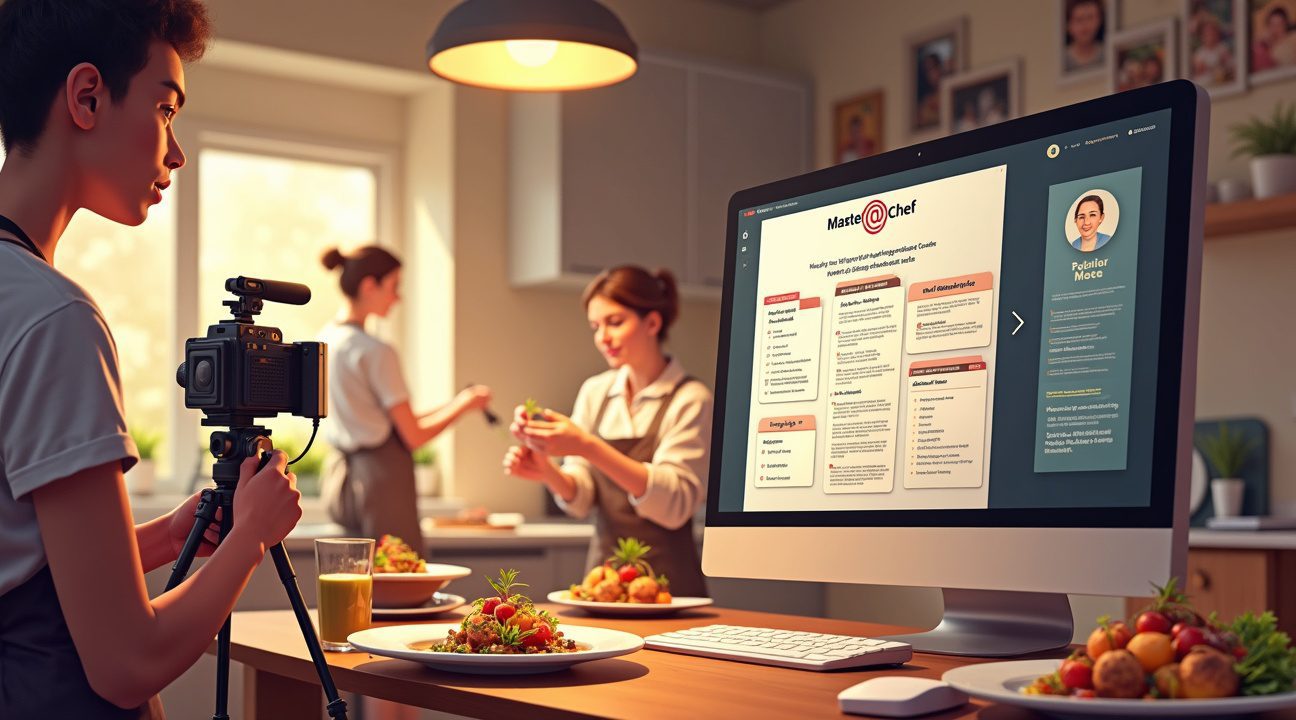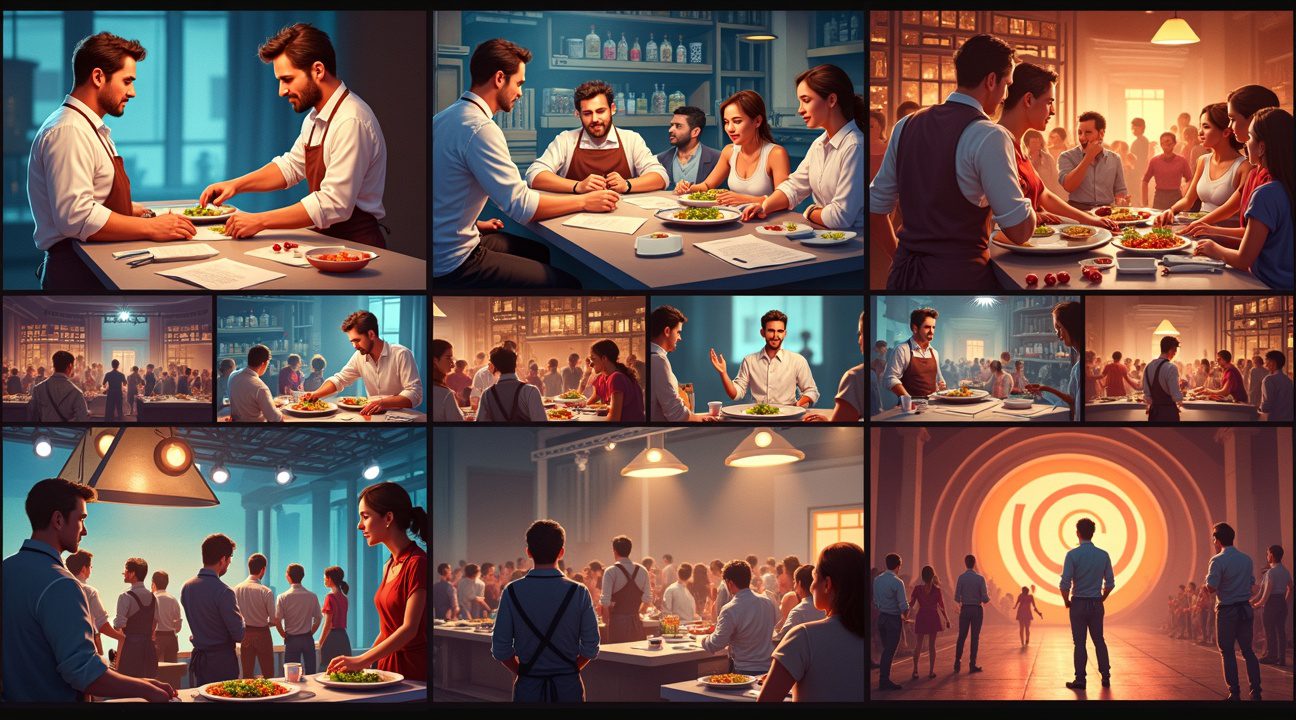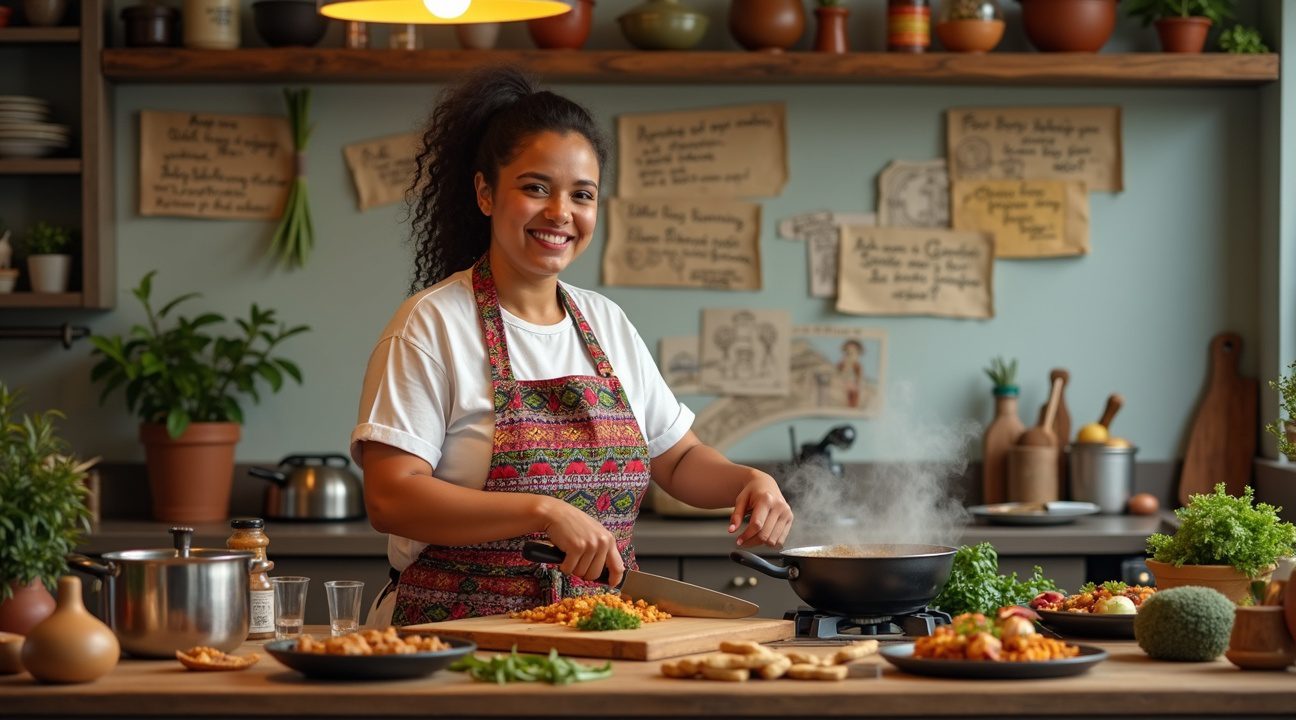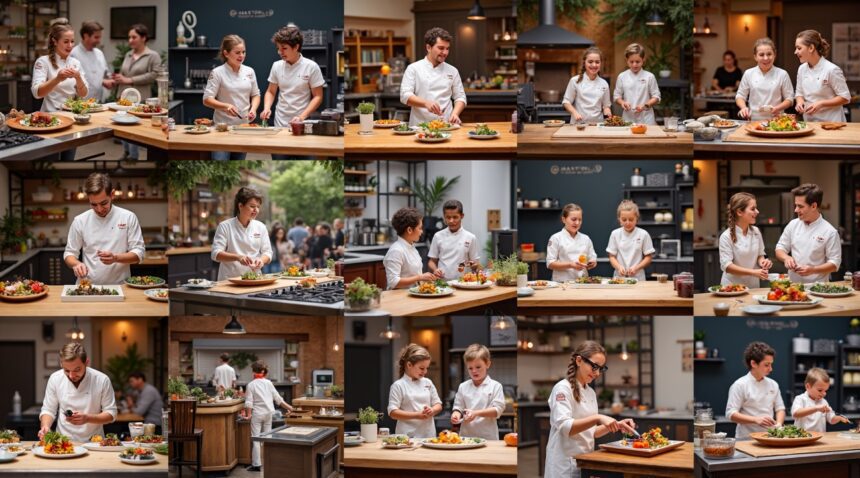Applying for MasterChef involves a comprehensive multi-stage process that begins with meeting specific eligibility requirements and submitting a detailed online application complete with personal essays, cooking photos, and video submissions.
Key Takeaways
- Eligibility varies by show version: MasterChef US requires applicants to be 18+ with no professional kitchen experience, while MasterChef Junior accepts children aged 8–13, and MasterChef: The Professionals is open to those 20+ with formal culinary training.
- Application components include: written essays, high-quality food photos, personal photographs, and video submissions that showcase both culinary skill and individual personality for casting directors.
- The selection process involves multiple stages: including phone interviews, virtual evaluations, signature dish demonstrations, and cooking trials that replicate the intensity and pressure of show conditions.
- Applications are free—but time intensive: deadlines are strict (such as July 2025 for the US season), and selected candidates must commit to 6–8 weeks of filming under strict confidentiality agreements.
- Success hinges on authenticity: Producers prioritize compelling personal stories and genuine personalities over technical perfection, seeking contestants who can create engaging television content.
Learn More
For additional application details and deadlines, visit the official MasterChef Casting Website, where you can find updated requirements, open call dates, and submission guidelines.
What It Really Takes to Get on the Show: MasterChef’s Essential Requirements
The MasterChef casting process sets specific eligibility criteria that vary significantly depending on which version of the show you’re targeting. Understanding these requirements becomes crucial before investing time in the application process.
Age and Legal Status Requirements Across All Versions
MasterChef US Amateur demands applicants be at least 18 years old and maintain legal residency status in the United States. Producers strictly enforce this amateur designation, which means anyone who has worked professionally in a kitchen environment faces automatic disqualification. The show specifically targets passionate home cooks who’ve developed their skills outside commercial kitchens.
MasterChef Junior operates under completely different parameters, accepting children between 8 and 13 years old as of specified cutoff dates, such as October 20, 2023. Legal guardians carry full responsibility for submitting applications and managing the entire process. This age restriction ensures contestants possess appropriate maturity levels while maintaining the show’s family-friendly atmosphere.
MasterChef The Professionals in the UK sets the bar considerably higher, requiring applicants to be at least 20 years old with substantial professional experience. Candidates must demonstrate either two years of professional kitchen experience or hold formal culinary qualifications like NVQ Level 3 706/1 and 706/2 or equivalent certifications.
Professional Experience Standards
The amateur designation for MasterChef US creates interesting challenges for applicants who might have dabbled in food service. Even brief professional kitchen experience can disqualify potential contestants, regardless of how minimal that experience might seem. This rule protects the show’s core concept of discovering hidden culinary talent among everyday home cooks.
Professional versions demand opposite qualifications, celebrating trained chefs and culinary professionals. The UK’s Professionals edition specifically seeks contestants who’ve committed to culinary careers and possess verifiable industry credentials. This distinction helps maintain clear boundaries between amateur passion and professional expertise.
All versions require participants to have legal authorization to live and work in their respective countries throughout filming and broadcast periods. Immigration status affects eligibility, and producers verify these requirements during background checks.
The casting teams enforce these requirements rigorously, often conducting extensive background investigations to verify professional kitchen experience claims. Entertainment industry standards typically demand thorough vetting processes, and MasterChef follows similar protocols. Applicants who misrepresent their experience face immediate elimination from consideration, regardless of their cooking abilities.
Geographic restrictions also play important roles, as each country’s version maintains specific residency requirements. These limitations help producers manage logistics while ensuring contestants can fulfill their obligations if selected for the show.
The Complete MasterChef Application Process: From Forms to Photos
Every aspiring chef dreaming of donning that coveted apron must start with the official online application form. This digital gateway serves as the first impression for casting directors, so I can’t stress enough how crucial it is to approach this step with genuine enthusiasm and attention to detail.
Essential Application Components
The standard application form requests comprehensive personal information that goes far beyond basic contact details. Casting teams want to understand who you are as both a person and a cook. The form requires a detailed culinary background summary that should highlight cooking experiences, training, and what drives your passion for food. I’ve seen applications that stand out because they tell a compelling story about the applicant’s journey in the kitchen.
Personal photographs play a vital role in the selection process. These images should capture your personality and present you in the best light possible. Additionally, applicants must submit high-quality photographs of plated dishes they’ve prepared. These food photos often become the deciding factor between acceptance and rejection, so professional-quality images are essential.
The application also includes essay-style questions that explore your passion for cooking, skill level, and personal story. These responses give casting directors insight into your personality, determination, and what makes you unique. I recommend crafting answers that showcase authenticity while demonstrating why you’d be compelling television.
Supporting Materials and Video Requirements
Beyond the written application, candidates must provide supporting materials that bring their culinary skills to life. A short video submission typically accompanies the application, showcasing both cooking abilities and personality. This video opportunity allows applicants to demonstrate their kitchen confidence and communication skills – qualities that translate well to television.
The video should capture you preparing a signature dish while explaining your technique and sharing your story. Production teams look for natural charisma and genuine passion that comes through the screen. I always advise keeping the energy high and letting your authentic personality shine through, as this often matters more than perfect technique.
Special considerations apply for MasterChef Junior applications. Only a legal guardian can complete and submit the application on behalf of young contestants. This process includes all the same materials and documentation requirements, but parents or guardians must handle every aspect of the submission process.
Documentation requirements vary by season and location, but typically include:
- Signed releases
- Background check authorizations
- Availability confirmations
The application process often opens months before filming begins, giving selected contestants time to prepare for the intensive production schedule.
Success in the application phase often comes down to presenting a complete picture of who you are as both a cook and a person. While technical skills matter, casting directors equally value compelling personal stories and engaging personalities. The combination of strong culinary photos, authentic written responses, and a dynamic video submission creates the foundation for advancing to the next selection phase.
Modern applications have streamlined significantly compared to earlier seasons, with digital platforms making submission more accessible. However, the core elements remain consistent across all versions of the show. Each component serves a specific purpose in helping casting teams identify contestants who will create compelling television while demonstrating genuine culinary talent.
The application represents just the beginning of what can be a lengthy selection process. Those who advance beyond this initial stage typically face additional interviews, cooking challenges, and psychological evaluations. Yet without a strong application foundation, even the most talented home cooks won’t get the opportunity to showcase their abilities in person.

From Application to Kitchen: The Multi-Stage Selection Process
The journey from application submission to potentially joining the MasterChef kitchen involves several challenging phases that test both culinary abilities and on-screen presence. Once the initial application reaches the production team, selected candidates receive invitations to participate in various screening rounds designed to evaluate their cooking skills and television potential.
Initial Screening and Virtual Evaluations
Production teams typically conduct preliminary screenings through a combination of phone interviews, video calls, and sometimes in-person auditions. These sessions allow casting directors to assess personality, communication skills, and genuine passion for cooking. Candidates often receive specific instructions to prepare talking points about their culinary background, personal story, and motivations for joining the competition.
Many applicants also participate in open casting events held in major cities, where hundreds of hopeful contestants gather for brief auditions. These events require participants to bring pre-prepared dishes and engage in short interviews with casting personnel. The atmosphere remains highly competitive, with only a small percentage advancing to subsequent rounds.
Culinary Demonstrations and Signature Dishes
Advanced candidates must demonstrate their cooking abilities through signature dish presentations, either during live auditions or via submitted video footage. This stage proves critical, as producers evaluate both technical cooking skills and the ability to explain culinary choices clearly on camera. Applicants typically receive guidelines specifying time limits, ingredient restrictions, and presentation requirements for these demonstrations.
The signature dish component serves multiple purposes beyond showcasing cooking talent. Producers observe how contestants handle pressure, communicate their cooking process, and maintain composure while being filmed. These qualities become essential for success in the high-stress television environment that defines the MasterChef competition format.
During this phase, candidates may participate in cooking trials that simulate actual show conditions. These sessions often involve mystery box challenges or pressure tests similar to those featured in the broadcast episodes. Production teams use these trials to gauge how applicants perform under time constraints and unexpected circumstances.
The interview process intensifies significantly for candidates who advance past initial screenings. Producers conduct extensive conversations covering personal history, cooking experience, career goals, and potential storylines that could develop during filming. These discussions help determine whether applicants possess the compelling personal narratives that television audiences find engaging.
Background checks and legal documentation requirements become increasingly important as candidates progress through selection stages. Production companies must verify personal information, conduct psychological evaluations, and ensure contestants can commit to the demanding filming schedule. This paperwork process often includes:
- Confidentiality agreements
- Medical clearances
- Availability confirmations spanning several months
The timeline from application to final selection typically extends across several months, with significant waiting periods between each stage. Candidates frequently report waiting weeks or even months between initial screenings and callback notifications. This extended process allows production teams to carefully evaluate large applicant pools while accommodating complex filming schedules and location logistics.
Communication during the selection process remains deliberately limited, with candidates receiving minimal feedback about their progress or standing relative to other applicants. Production teams maintain strict confidentiality protocols to preserve the integrity of the selection process and prevent information leaks that could compromise the show’s competitive nature.
Final selection rounds often involve the most intensive evaluation procedures, including:
- Extended cooking challenges
- Comprehensive interviews
- Compatibility assessments with other potential contestants
Producers consider factors beyond individual cooking ability, such as group dynamics, personality conflicts, and storyline potential when making final casting decisions.
The entire selection pipeline requires tremendous patience and persistence from applicants, as rejection can occur at any stage despite strong culinary skills or compelling personal stories. Many successful contestants report applying multiple times across different seasons before receiving acceptance letters, highlighting the competitive nature of the process and the importance of continuous skill development between application cycles.

Critical Application Deadlines and Financial Details You Need to Know
I understand that timing and financial considerations often determine whether someone can pursue their culinary dreams on MasterChef. The good news is that applying and auditioning for MasterChef doesn’t cost contestants anything across all series versions. This free application process removes a significant barrier that might otherwise prevent talented home cooks from showcasing their skills.
Essential Application Deadlines
MasterChef operates on strict seasonal deadlines that I recommend marking on your calendar well in advance. For the US 2025 season, contestants must submit their applications by July 20, 2025, at midnight PST. Missing this deadline by even a few minutes means waiting an entire year for the next opportunity.
Different versions of the show maintain their own timelines. MasterChef Junior typically runs on an earlier schedule, with closing dates like October 13 for recent cycles. I suggest checking the specific show’s official website regularly, as these dates can shift depending on production schedules and network decisions. Creating calendar reminders at least two months before deadlines helps ensure you don’t miss crucial submission windows.
Some contestants have found inspiration from unexpected sources – just like how entertainment franchises capture audiences with fresh approaches, MasterChef seeks unique culinary perspectives that stand out from traditional cooking backgrounds.
Required Documentation and Travel Preparation
Finalists face additional requirements beyond the initial application. I’ve seen many promising contestants stumble at this stage because they weren’t prepared for the documentation process. Successful applicants must provide comprehensive identity verification and eligibility confirmation documents.
A valid passport becomes essential since filming often requires travel flexibility. Even if you’re applying for a domestic version of MasterChef, producers may request proof of travel readiness. This requirement stems from the show’s demanding production schedule, which sometimes includes location shoots or unexpected travel opportunities.
Financial preparation extends beyond the free application. While the show covers many expenses during filming, I recommend having personal finances in order before advancing through the selection process. Contestants often need to take extended time off work, and having a financial safety net prevents stress that could impact cooking performance.
International contestants face additional documentation requirements. Visa applications, work permits, and travel insurance often become necessary depending on your home country and the show’s filming location. Starting these processes early prevents last-minute complications that could derail your MasterChef journey.
The documentation process serves multiple purposes beyond legal compliance. Producers use this stage to assess contestants’ commitment levels and organizational skills. Someone who struggles with paperwork might face challenges managing the intense pressure of professional kitchen environments.
I’ve observed that successful applicants often treat deadline management as their first MasterChef challenge. They create detailed timelines, gather documents months in advance, and maintain backup copies of everything. This preparation demonstrates the professional mindset that judges value in potential contestants.
Remember that different international versions may have varying financial policies. While the core application remains free, some regional adaptations might have different approaches to travel expenses or documentation requirements. Always verify specific details with the official casting team for your target show version.
The free application policy reflects MasterChef’s commitment to discovering talent regardless of economic background. This approach has uncovered extraordinary cooks who might never have applied if facing financial barriers. Whether you’re inspired by diverse storytelling approaches like creative adaptations or groundbreaking entertainment ventures, MasterChef values fresh perspectives over financial capacity.
Smart applicants use the time between application submission and potential callbacks to continue developing their skills. This period isn’t just waiting time—it’s an opportunity to refine techniques, expand recipe knowledge, and build the confidence that separates successful contestants from those who flame out under pressure.
What to Expect If You Make It: Time Commitment and Filming Reality
Making it onto MasterChef represents an incredible opportunity, but I need to be realistic about what lies ahead. The filming schedule demands a significant commitment that goes far beyond what viewers see on television. Production companies require contestants to dedicate substantial blocks of time to create the compelling content that makes the show successful.
For MasterChef US, I should expect to commit 6 to 8 weeks of my life to filming. This extended period allows producers to capture all the challenges, eliminations, and dramatic moments that define each season. Different shows handle their production schedules differently, but MasterChef maintains consistency in its demanding timeline.
MasterChef: The Professionals operates on a slightly more condensed schedule, requiring approximately 6 weeks or around 25 days on set. This shorter timeframe doesn’t mean less intensity – professional chefs face equally rigorous challenges packed into fewer days. The production team understands that working professionals need to return to their careers, so they structure filming accordingly.
Managing Life During Filming
Taking this much time away from regular life requires careful planning. I must arrange extended leave from work or school, which can be challenging depending on my employment situation or academic schedule. Some employers are understanding about unique opportunities like this, while others may not be as flexible. Students need to coordinate with professors and possibly defer coursework or exams.
Financial considerations also come into play during this extended absence. While production provides meals and accommodation during filming, I still need to cover my regular expenses back home. Bills don’t stop because I’m pursuing a culinary dream, so having savings or other income sources becomes essential.
Family responsibilities add another layer of complexity to the commitment. Parents need childcare arrangements for weeks, and anyone caring for elderly relatives must organize alternative support. These practical matters often determine whether someone can actually participate, even after being selected.
The production environment itself differs dramatically from normal life. Days can run extremely long, with challenges lasting many hours followed by interviews and additional filming. Entertainment production schedules rarely follow traditional 9-to-5 patterns, and contestants must adapt to irregular timing and high-pressure situations.
Strict confidentiality rules govern every aspect of the experience. All participants must sign comprehensive non-disclosure agreements before filming begins. These NDAs prevent me from discussing anything about my involvement – including the fact that I’m even on the show – until production gives explicit clearance. This means keeping the secret from friends, family members not already aware, and especially social media.
The confidentiality requirements extend beyond just not spoiling results. I can’t share behind-the-scenes details, discuss other contestants, or reveal production methods. Even after the show airs, certain aspects remain off-limits for discussion. Major productions take these agreements seriously, and violations can result in significant financial penalties.
Living in this bubble of secrecy for weeks creates an unusual psychological experience. Normal social interactions become complicated when I can’t explain where I’ve been or what I’m doing. The isolation from regular life, combined with the competitive pressure, makes the experience emotionally demanding as well as physically exhausting.
Production teams provide support systems to help contestants manage these challenges, but ultimately I’m responsible for ensuring I can handle the commitment before accepting a spot on the show. The opportunity represents a potentially life-changing experience, but only if I’m prepared to fully dedicate myself to the process and handle all the practical realities that come with it.
Proven Strategies to Make Your Application Stand Out
Authenticity forms the foundation of every successful MasterChef application. Past contestants consistently emphasize that producers can spot fake personalities from miles away, so I recommend dropping any attempts to create a television-ready character. Instead, showcase your genuine self throughout the entire process.
Personal stories carry tremendous weight in applications. I suggest weaving your culinary journey into compelling narratives that reveal your passion’s origins. Maybe you learned to cook from your grandmother’s handwritten recipes, or perhaps you discovered your love for food during travels abroad. These authentic moments help producers understand who you are beyond your cooking skills.
Demonstrating Culinary Range and Personality
Successful applicants display both technical competence and creative flair in their submissions. I recommend highlighting your signature dishes alongside fundamental cooking techniques you’ve mastered. Show producers you can execute a perfect risotto while also creating innovative flavor combinations that reflect your unique culinary perspective.
Humor naturally emerges when you’re comfortable being yourself, and producers value contestants who can bring levity to stressful situations. Don’t force jokes, but let your natural wit shine through during interviews and cooking demonstrations. Remember that entertainment value plays a significant role in casting decisions.
Your application should paint a picture of someone producers want to follow through an entire season. I encourage applicants to share what drives their culinary ambitions beyond winning the competition. Perhaps you dream of opening a restaurant that celebrates your heritage, or maybe you want to revolutionize home cooking through innovative techniques.
Document your cooking skills through high-quality photos and videos that capture both the final dishes and your cooking process. Producers need to see your knife skills, organizational abilities, and how you handle pressure in the kitchen. Don’t rely solely on perfectly plated final products – show the passion and intensity you bring to cooking itself.
Your personality should complement your culinary skills rather than overshadow them. I’ve noticed that successful contestants possess strong opinions about food while remaining open to learning from judges and fellow contestants. This balance demonstrates confidence without arrogance, a quality that translates well to television.
Prepare for the application process by practicing your elevator pitch – a concise explanation of who you are, what makes your cooking special, and why you belong on MasterChef. This preparation helps you articulate your passion clearly during phone interviews and casting calls. Like following casting announcements, timing and preparation often determine success in competitive applications.

Sources:
us.masterchef.com
Celebration Generation article
Twisted Food article
MasterChef UK
MasterChef Junior Casting FAQs
MasterChef Casting FAQs
MasterChef Junior Casting How To Audition


